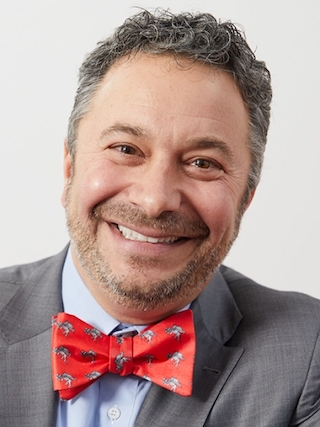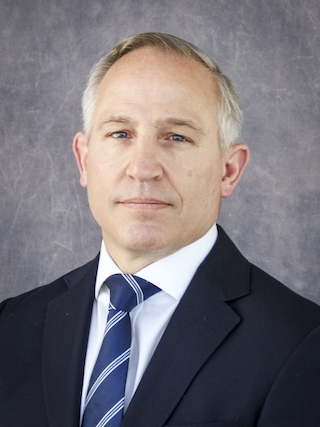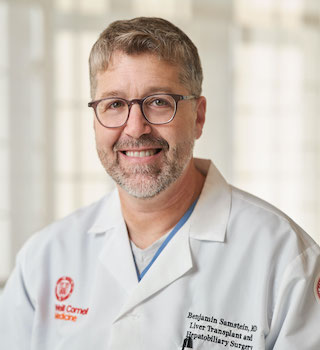‘The Greatest Act of Love’
When a rare liver disease left Lauren Toby in need of a transplant, her husband, DJ, stepped up to be her living donor.
The first few years of marriage were a whirlwind for Lauren and Donald John Toby: a wedding in 2019 followed by an adventure-filled honeymoon exploring New Zealand; buying and renovating a house on Long Island, New York; and the birth of their son during a pandemic.
But in 2021, their vows to love each other “in sickness and in health” would take on a new meaning. Lauren, who had been diagnosed five years prior with primary sclerosing cholangitis (PSC), a rare liver disease, now needed a transplant.
Her husband was determined to be part of the solution. “I didn’t think twice or delay at all,” Donald John, known as DJ, says of his decision to become Lauren’s living donor. So in January 2023, the couple arrived hand in hand at NewYork-Presbyterian/Weill Cornell Medical Center, where DJ would donate a portion of his liver to his wife.
“It’s been a wild ride,” Lauren, 36, says. “As hard as this experience has been, it’s also been so beautiful. I always knew I married the right person, but this sure reaffirms it.”
A Rare Diagnosis
Long before their wedding, Lauren and DJ had each other’s hearts. The pair met in high school, and though they were just friends at the time, there was an undeniable spark. They reunited after college, with DJ leaving his job managing crew on a cruise ship to stay in New York to be with Lauren.
“DJ was the life of the party,” Lauren says. “He was an All-American lacrosse player, very athletic, while I was a super nerd. We’re very much opposites.”
“She’s smart, and was always quirky and funny, doing things to make everyone laugh,” DJ, 36, adds.
During their budding romance, Lauren, who is a manager at a civil engineering firm, was dealing with the onset of her health issues. She was diagnosed with ulcerative colitis, a chronic inflammatory bowel disease affecting the large intestine. That same year, test results showed abnormal liver enzyme levels — she also had PSC, a condition affecting 5 to 16 out of every 100,000 people, according to the National Institute of Diabetes and Digestive and Kidney Diseases.
With PSC, bile ducts become inflamed and scarred over time, eventually becoming blocked. The bile buildup causes liver damage, putting a person at risk for infection and cancer.
“I had no other symptoms aside from diarrhea and weight loss from the ulcerative colitis, so it was a surprise,” Lauren says. “I decided I wanted to be at a research hospital.”
In 2018, upon a recommendation, Lauren sought a second opinion from Dr. Robert S. Brown, chief of the Division of Gastroenterology and Hepatology at NewYork-Presbyterian/Weill Cornell Medical Center. He confirmed her PSC diagnosis and explained the disease’s unique nature: She could feel fine for months or even years, but at any moment could fall seriously ill.
‘She Was a Ticking Time Bomb’
Lauren’s health remained stable for another three years. During this time, she and DJ enjoyed life together — watching beach sunsets and taking trips to ski and hike. They got married, and they celebrated the birth of their son, Donovan.
However, Lauren’s PSC loomed in the background, and her symptoms were getting worse. She experienced chronic fatigue, rapid muscle and weight loss, jaundice, and debilitating itching caused by higher levels of bile salt accumulating under her skin.

Dr. Robert S. Brown
In 2021, to clear a large blockage in her liver, Lauren underwent endoscopic retrograde cholangiopancreatography (ERCP), a procedure that uses upper gastrointestinal endoscopy and X-rays to treat bile ducts. But she still had multiple smaller blockages that couldn’t be remedied by an ERCP, says Dr. Brown. As there are no other proven therapies or treatments for PSC, Lauren’s care team began discussing the idea of a transplant.
“We knew she was only going to get worse over time,” says Dr. Brown, who is also the Vincent Astor Distinguished Professor of Medicine at Weill Cornell Medicine. “She was a ticking time bomb, because there were always going to be recurring infections and a risk of developing cancer of her bile ducts. It wasn’t a question of ‘if’ she’d need a transplant, it was ‘when.’”
“We had just started our family, I had everything I always wanted,” Lauren says. “It was terrifying to hear.”
The Decision to Donate
Lauren was placed on the national waiting list for a liver transplant in January 2022. But it wouldn’t take long for DJ to decide he wanted to be her living donor. He was the same blood type, and evaluations of his liver proved he was a match.
“The idea that she would just get sicker and sicker, hoping that a liver would come — that was terrible,” DJ recalls. “I thought, ‘I’m going to be the donor. It’s my only shot.’”
“He never blinked an eye. He really took the edge off the fear for me. DJ is a captain at work and by nature,” says Lauren of DJ, who is a harbor pilot. “A captain always goes down with his ship, does whatever’s needed, and he is that for our family.”
Given the long progression of her disease, a living donor was beneficial for Lauren. “She was sick enough to need a liver transplant, but not sick enough to access a transplant immediately,” Dr. Brown explains. With a living donor, the operation could be done before she got too sick, allowing her a high quality of life.
Opting for a living donation also afforded the couple the ability to schedule and prepare for the major surgery. They could wait until Donovan, then 1, was a little older, and they could arrange for child care and a recovery plan with the help of their families.

Dr. Juan Rocca
Stronger Than Ever
On Jan. 24, 2023, DJ and Lauren underwent a successful liver transplant surgery, led by Dr. Benjamin Samstein, chief of liver transplantation at NewYork-Presbyterian/Weill Cornell Medical Center, and Dr. Juan Rocca, attending surgeon at New York-Presbyterian/Weill Cornell Medical Center.
DJ’s procedure was performed via minimally invasive laparoscopy, in which a thin surgical tool was inserted through a 5-inch incision in his abdomen to remove 35% of his liver. NewYork-Presbyterian has one of the few transplant programs in the country where removal of donor liver is done fully laparoscopically. “Over the last year, all our living liver donor operations have used this technique, and it cuts the recovery time in half,” says Dr. Samstein.
In a separate operating room, a portion of DJ’s liver was then implanted into Lauren. Her removed liver was found to have scarring, multiple stones, and bile duct blockages with infection, which would have led to greater illness, her physicians say.

Dr. Benjamin Samstein
“The opportunity to save a life, whether it’s the life of your wife or someone you care about, is not something that comes up every day,” says Dr. Samstein, who is also surgical director of the Living Donor Liver Transplant Program at NewYork-Presbyterian and professor of surgery at Weill Cornell Medicine. “I’m in awe of our donors who step forward, and as a physician, it’s an enormous privilege to get to know them.”
DJ went home four days after his surgery and returned to the hospital days later to visit Lauren as she continued to recover. “The care team at NewYork-Presbyterian has been amazing,” Lauren says. “As a transplant recipient, you feel very vulnerable, particularly in the beginning stages. But I’ve never felt like I didn’t have somebody immediately available to provide any information that I needed, from the liver team to the nursing assistants to the nutritionists and pharmacists.”
Lauren went home 11 days later and will continue to see her care team for weekly follow-ups, with the frequency decreasing as her condition improves.
“My wife is braver and tougher, and I think we’re going to come out better from this, stronger than ever,” DJ says.
During their tearful reunion, Lauren reflected on DJ’s life-changing decision.
“It is the greatest act of love that anyone could possibly ever do,” she says. “I feel like we’re more connected than ever. Getting a second chance, you want to do everything and enjoy every second. You want to eat up the world. It seems like this illness is unlucky thing that happened to me, but I can’t believe how lucky I am.”
Additional Resources
Learn more about NewYork-Presbyterian’s Living Donor Liver Transplant Program.
See how you can sign up to become an organ donor.
